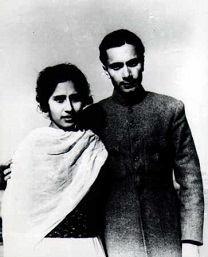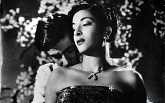Balraj Sahni: A great link between Russia and Bollywood
 |
| Balraj Sahni with his wife Damayanti, 1936. Source: wikipedia.org |
Every time the topic of 100 years of Indian Cinema comes up in Russia, Indophiles raise their glasses to Raj Kapoor, who reached out to the hearts of million across the Soviet Union. However, there was another giant of Indian Cinema, who passionately loved Russia and did a lot to promote cultural and even political ties between the two countries: Balraj Sahni.
Sahni, an avowed Socialist was born on International Labour Day, May 1, 1913 in Bhera, a city that is now in Pakistan. After earning two Masters Degrees in English Literature, he moved to Bengal in the 1930s to teach English at Rabindranath Tagore’s Visva-Bharati University. Later in the decade, he went to London to work for the BBC’s Hindi service as a radio announcer.
The future film legend stopped taking the silver screen seriously for a time when he was in the British capital. In his autobiography, Sahni wrote that he no longer viewed films as an art-form. “In my eyes, they became ‘devalued’. A couple of days later, however, the war situation changed radically, in the light of which, I had to change my opinion-Russia had now entered the war as an ally of England, and a cinema on Tottenham Court Road started showing Russian films,” he wrote.
“It was, in fact, a Russian, film which I happened to see in that picture-house that restored my confidence in films, indeed in life itself,” Sahni wrote. “It brought home to me the nobility and the magnanimity the human spirit was capable of displaying. After all these years, I still recollect every detail of that memorable film. It was called ‘The Circus.’ The 1936 melodramatic Russian comedy was directed by Grigori Aleksandrov and Isidor Simkov at the Mosfilm studios.
“The film had a profound effect on my mind—so much so that, when I came out of the picture-house, I was in a world of my own, totally unmindful of the splinter of glass and stones flying about me—obviously the result of a bomb which had exploded in the neighbourhood!” Sahni became a regular visitor to that London film house. “That picture-house on Tottenham Court Road now became for me a veritable haven, and the Russian films I saw there—amongst them such masterpieces as Alexander Nevsky, Battleship Potmakin, Baltic Deputy, Mother, Gorky’s Life, Volga-Volga—a source of inspiration, a sort of tonic which fortified my faith in humanity,” he wrote in the autobiography.
Those Russian films not only inspired Sahni in many ways, both professionally and in shaping his political views. After watching the films, he started taking an interest in Soviet art, eager to learn more. “I wanted to know more about their films and their artistes,” Sahni wrote. “I read a number of books, analysing the technique and philosophy of those films. I was pleasantly surmised to find that even eminent critics had hailed as master-pieces the very films which I had appreciated so much! Eisenstein and Pudovkin were now familiar names to me.”
Sahni particularly admired Nicholai Cherkasov, who played the lead role in Sergei Eisenstein’s Alexander Nevsky.
In the post-independence years, Sahni would grow closer to Russia and be recognised for his work, something he could never predict while he was in wartime London. He wrote in his autobiography: “Little did I then imagine that I myself would visit their country one day and that they in turn would see my film –‘Do Bigha Zamin’ or that I would have an opportunity to greet them with bouquets when they came to India!”
Critics and film-lovers largely agree that Sahni’s best performance as an actor was in Bimal Roy’s 1953 masterpiece ‘Do Bigha Zameen,’ which won the International Prize at the Cannes Film Festival. The film, which was inspired by Vittorio De Sica’s ‘Bicycle Thieves,’ has a strong Socialist theme. Sahni also stood out for his outstanding acting in a film adaptation of Tagore’s Kabuliwala and what this writer considers his Magnum Opus as an actor, ‘Garam Hawa,’ a story of an Indian Muslim family that stayed back in the country after the partition.
Throughout his life, Sahni stayed committed to socialism as a political ideology and he remained a friend and admirer of the USSR. He visited the country in 1969 and penned a travelogue in his native Punjabi, titled ‘Mera Russi Safarnama,’ for which he was awarded the Soviet Land Nehru Award.
He died of a massive heart attack, just a few weeks before his 60th birthday in 1973.
One of India’s greatest actors, Balraj Sahni, is still held in the highest esteem by the Bollywood fraternity. He is also one of the strongest links between Russian film traditions and the Indian film industry.
All rights reserved by Rossiyskaya Gazeta.
Subscribe
to our newsletter!
Get the week's best stories straight to your inbox

.jpg)
